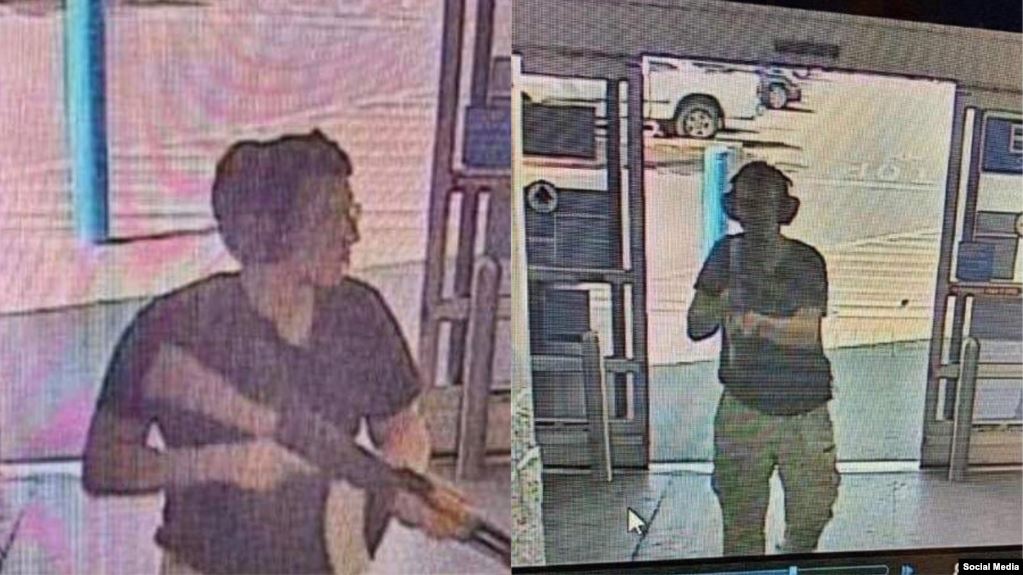"It's a destructive moment for this country," said the executive director of the Los Angeles-based National Day Laborer Organizing Network. "This is the first time when I feel as if our adversaries have declared war against our immigrant community."
The massacre of 20 people Saturday by a man who travelled 650 miles to a Walmart in El Paso, reportedly with the intention of shooting "as many Mexicans as possible," marks what appears to be one of the deadliest hate crimes ever against Latinos.
The killer gunned down an Army veteran who loved listening to oldies on Sunday mornings, a 15-year-old high school student and soccer player, a mother who apparently used her body to shield her 2-month-old child, and 17 others, whose stories are still emerging.
The mass violence - and the bigoted motive that echoed the worst racist rants of anti-immigrant hard-liners - marked for many Latinos a devastating new low in the Trump era.
Like Alvarado, many Latinos on Sunday said they felt that the anger towards their community is reaching a boiling point, fuelled by the heated politics of immigration.
Many said they believe that hostility is encouraged by a president who attacked a federal judge's impartiality for being "a Mexican," who frequently refers to asylum seekers and migrants who cross the border without authorization as part of an "invasion," and who, at a rally speaking about migrants, said: "How do you stop these people? You can't," and then chuckled and joked along when someone in the crowd shouted, "Shoot them."
For those here without legal status, the Trump era has been marked by family separations, detention centres and the persistent threat of widespread raids touted by the president. Others struggle with larger questions about racism and how hostility against Latinos has moved from the margins to the nation's centre stage.
Moving forward, many fear that unless something major changes, there will be more violence, beyond that unleashed in El Paso.
Miguel Luna was cooking eggs and bacon for his family Sunday when his wife told him of the tragedy in El Paso. He read the manifesto calling the attack "a response to the Hispanic invasion of Texas."
"I felt physical pain throughout my body, like food poisoning," said Luna, a community organizer from Westlake who focuses on environmental issues.
As details about the victims came out in the news, he felt a sense of threat, fear and rejection in a country his mother fought hard to reach after she left Colombia decades ago. Luna believed that the true weapon behind the violence in El Paso was President Donald Trump.
"His words are the ammunition and people of colour are his target," he said. "And he's not ceasing, and it's all very methodical and directed."
When Trump took office, Luna expected that political winds may shift against immigrants, and he launched a photo project online to celebrate their stories. He called it the Power of U and featured dozens of Latino immigrants - educators, political leaders, architects and activists.
"I wanted this to be an opportunity for us to highlight all the good things we bring to this country," he said.
On Sunday, the father of two took some comfort in the positive space he created for the community at a time of uncertainty. But real change will take much more, he said.
In Gilroy, California, the streets were quiet one week after another gunman shot and killed three people at the popular Gilroy Garlic Festival, shortly after posting online about "hordes of mestizos" and encouraging people to read a book associated with white supremacists. Authorities in that case have said that the gunman did not appear to target any particular group and that his motive may never be known. But the shooting, along with the massacre in El Paso, left people afraid.
Parks were empty, church parking lots were barren, and many businesses were deserted.
Gerardo Ortiz sat in a wheelchair, parked in his usual spot outside St Mary Parish. Passersby greeted him in English and Spanish as Mass began, though there weren't many people attending.
Ortiz, 73, said he has experienced racism all his life - back in Puebla, Mexico, where he lived more than 35 years ago, and here in the United States. But he too thinks that the recent escalation in gun violence can be attributed to the influence of Trump.
"This president provokes more violence, he shouldn't have that vocabulary," Ortiz said in Spanish. "If he sets that example, other people are going to follow what he says and does."
Across the street, the owner of a party supplies store hung up three pinatas outside the storefront. Leon, who did not want to give his last name because of concerns about his legal status, has lived in the United States for about 40 years and has owned the store in Gilroy for seven.
He said the Latino community in Gilroy, particularly the Mexican community, is very close - and that he and his family were deeply saddened by reports that the shooter who opened fire in El Paso may have been fuelled by hate toward Latinos.
"The Latino community is hurting," Leon said.
Since Trump's election, and especially since the announcement of the possibility of large-scale immigration raids several weeks ago, Leon's children have also worried that both their parents may be deported, he said.
"They are scared that their mother isn't going to come back home," Leon said. And he feels that concern too.
"That's the fear: that you are going to leave your house and never come back."
In the parking lot at the Walmart Supercenter in Pico Rivera on Sunday morning, David Llamas maintained a wide-angle vigilance as he prepared to hit the road with a trunkful of Dodgers souvenirs to hawk.
He was on the lookout for furtive movements, backpacks and suspicious gazes.
"I'm watching everyone from the corner of my eye," Llamas, 56, said. "It's come to this - you've got to watch where you shop.
"Things have changed: We've got a president who is promoting racism," he said. "How does he get away with all the crap he's saying about la raza? I don't know. But it's not a good deal."
Mike Madrid, a Republican political consultant, said he always knew resentment and racism was just underneath the surface of American society.
Still, he'd spent 25 years trying to connect two major parts of his life - his conservative political philosophy and his race and identity.
He believed racism was just a fringe element in the Republican Party, percolating in its darkest corners but inevitably called out.
But something changed under Trump, he said.
"The president of the United States was elected in large part on an anti-Latino agenda," Madrid said. "There is no other way you can feel about it other than offended and attacked.
"White nationalism is the purest form of identity politics," he added. "It seeks to define 'Americanness' by one's lineage and ancestry. It views the growing Latino population as an invasion, as illegal, as criminal - as less than human. The next obvious step is violence."
---------------------------------------------------------------------------------------------------------
For Latinos, El Paso is a devastating new low in the Trump era
EL PASO, TEXAS, Los Angeles Times correspondents (tca/dpa)- Working with immigrants for 30 years, Pablo Alvarado has lived through decades of antagonism towards Latinos. It came in political waves that washed over California, Arizona and other states. There was Proposition 187 in the 1990s, the Minuteman protests, "America's toughest sheriff" Joe Arpaio and his hard-line policing tactics.
|
At a glance

|
The world in pictures
|









 Home
Home Politics
Politics










